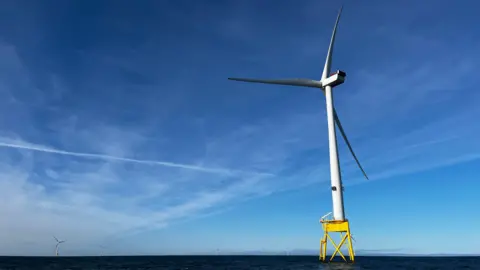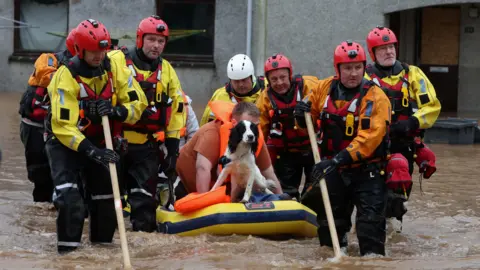Scotland will bear the brunt of climate costs
 BBC
BBCThe financial burden of tackling climate change will fall disproportionately on Scotland, the financial watchdog has warned.
The Scottish Fiscal Commission (SFC) said it would cost the public sector £1.1bn a year - 18% of the Scottish government's capital budget.
Environmentalists and economists say this is still cheaper than doing nothing - which would result in more having to be spent on the impacts of climate change, such as flooding, in the long term.
The Scottish government has already urged Westminster to provide more funding for important measures like tree planting.
The £1.1bn bill relates to the commitment to reach "net-zero" in Scotland by 2045 and for the UK as a whole by 2050.
That is the point where we will have reduced our planet warming greenhouse gas emissions close to zero, with the remainder being offset by things like trees which absorb carbon dioxide from the atmosphere.
The figures do not include spending on adapting to more extreme weather events by building more flood defences, for example.
SFC said the financial burden may fall disproportionately on the Scottish government because a greater share of the UK's overall commitments fall to tree planting in Scotland.
That equates to £207 per person in Scotland compared with £149 in the rest of the UK.
 Reuters/Russell Cheyne
Reuters/Russell CheyneThe commission's chairman, Prof Graeme Roy, said more information was needed from both governments about their plans for tackling all aspects of climate change.
He added: "Handling not just the achievement of net zero and the future adaptation challenges, but also their fiscal consequences is a shared endeavour that needs to be managed well by both Scottish and UK governments."
Prime Minister Rishi Sunak has already rolled back on some net-zero policies such as postponing the ban on sales of new petrol and diesel cars from 2030 to 2035.
He said the climate change commitments should be met in a "proportionate and pragmatic way".
Scottish ministers are still considering whether to change their target date for fossil-fuel cars.
'Vague' plans
The Scottish government has been struggling to fund some of its climate change pledges and has blamed the shortfall on cuts to the money it receives from Westminster.
A spokesperson for the UK government said: "Forestry is a devolved responsibility of the Scottish government and one it is well-funded to deliver upon through its record £41bn per year settlement from the UK government – the largest in the history of devolution.
“For our part we are delivering over £600bn of planned public sector investment over the next five years to drive future growth and support the UK’s energy security.
"This is also helping crowd in private sector investment vital for the transition, as part of our clearly outlined Net Zero Strategy.”
In December it was confirmed that the Scottish government was slashing its budget for tree planting by 41% from April, which the forestry industry has described as devastating.
One tree nursery owner has said he would have to burn millions of tree saplings as a result.
Stuart Goodall from the Confederation of Forest Industries (Confor) described the decision as "short sighted" during a climate emergency.
"Even the faster growing trees can take 30 years to grow and if we're going to make a contribution to net-zero by 2045, it's the trees that we plant this year and next year that will make the greatest difference," he said.
Audit Scotland has previously described plans to tackle the impacts of climate change as "vague" and the Climate Change Committee said Scotland had lost its lead over the rest of the UK on tackling the issue.
The environmental coalition Stop Climate Chaos Scotland said climate change was already having an impact on the economy and would do so increasingly unless it was brought under control.
Chairman Mike Robinson added: “Every penny spent on action during this decade will save many pounds in years to come, and crucially this doesn’t all have to be ‘new’ money.
“We must immediately reallocate public funds away from climate damaging activities, like road building or fossil fuel extraction.”
Net Zero secretary Mairi McAllan said: “We will continue to call on the UK Government to change course, and ensure future financial settlements provide us with the resources we need to secure a just and fair transition to net zero.”
